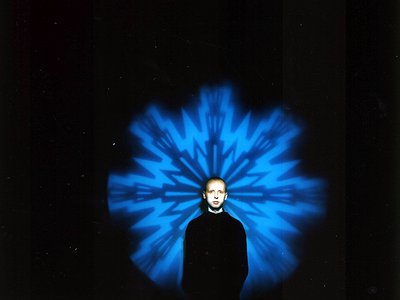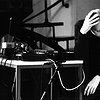Collaborations can take on many forms. What role do they play in your approach and what are your preferred ways of engaging with other creatives through, for example, file sharing, jamming or just talking about ideas?
Collaboration is key to my practice. The relationship between us is invaluable. I am a consistent collaborator in all fields, often with artists quite outside of the field of music. Whether it's with a writer, a DJ, a video maker, a choreographer or architect, the ability to exchange and share ideas is crucial and these collaborations allow me and the collaborator to work as both negatives and positives of each other, recognising spaces within the work fields and ideas of the other. It teaches the respect of space but also the relevance of context and extension of one’s ideas to the other.
Could you take us through a day in your life, from a possible morning routine through to your work? Do you have a fixed schedule? How do music and other aspects of your life feed back into each other - do you separate them or instead try to make them blend seamlessly?
I wake up early, with a body clock that refuses to sleep in. I’m up at the latest by 07.00, eat breakfast, read a magazine or book, then to the studio. Mornings can frequently be occupied by administration, emails, banking, all that kind of rather droll stuff. Lunch at midday, then back to the studio to work until 18.00 at the latest. I never work later than that and have maintained that pattern for many, many years. I like the evenings to be free to enjoy a film, listen to music, simply breathe, take a walk, see friends. I like to go to bed early too. I’m most definitely clearly not designed for a rock ‘n roll lifestyle :-)
In that sense, my schedule is fixed. I won’t work in the evenings, unless it’s utterly and absolutely essential for a project and even then, it’s unlikely to happen. Same at the weekends. Some people ask me how I manage to produce so many projects each year, from performance, installations, scores for film and contemporary dance and more, and I honestly think it’s largely down to discipline and being able to time manage effectively and efficiently.
Could you describe your creative process on the basis of a piece or album that's particularly dear to you, please? Where did the ideas come from, how were they transformed in your mind, what did you start with and how do you refine these beginnings into the finished work of art?
Fibolae (2017) has great meaning for me. It’s also the album I’ve probably actually spent the longest on, returning to pieces and revising them at frequent intervals over a matter of years. The title itself came to me whilst sleeping and has no meaning whatsoever which felt important to the release. It was born out of some very complex experiences – I lost my entire family to cancer and left the comfort of a familiar city, London, to live in a former textile factory in the UK to re-invent my life. The pieces on this release very much reflected an anger and colossal loss. I wanted to produce a work that used electronics in a tender and consummate way, drawing in influences from Swans, King Crimson to John Tavener. The final work is a sonic picture of a person determined to move forward, no matter what.
There are many descriptions of the ideal state of mind for being creative. What is it like for you? What supports this ideal state of mind and what are distractions? Are there strategies to enter into this state more easily?
I have no ideal state of mine in which to begin work. I simply sit down and begin. As long as I’m in a place for creativity I can be creative. I don’t depend upon any kind of ritualistic means of production or inspiration. I don’t drink alcohol, smoke, drink tea or coffee, anything that alters my condition in fact. My creative state of mind is no different than my daily state of mind, whether that’s good or bad I don’t know!
How is playing live and writing music in the studio connected? What do you achieve and draw from each experience personally? How do you see the relationship between improvisation and composition in this regard?
I have played live significantly less in recent years, and focused more on studio and location based work with collaborators. I have little interest in making a recording, releasing it on CD or vinyl, then touring to promote that product. I last did this in 2001 across the USA and found myself so utterly worn out and dispirited by the experience, physically and mentally, that I made the decision never to do this again.
As such my live shows these days rely on a small modular synth set up with effects, short wave radio and perhaps an instrument of sorts. Completely improvised, risky and free. I find no reward in playing back music that was produced in a studio situation, like a kind of digital jukebox.
How do you see the relationship between the 'sound' aspects of music and the 'composition' aspects? How do you work with sound and timbre to meet certain production ideas and in which way can certain sounds already take on compositional qualities?
This very much depends upon the situation I think. I ‘compose’ music in a more traditional sense for contemporary dance for example. At time of writing I’ve written over 65 works for dance, sometimes using electronics, sometimes using orchestral players, sometimes a combination of both. I have never made any judgement calls between ‘sound’ and ‘music’ or composition. The works are what they are when they are finished. They are shapes in sound, sometimes made with more traditionally recognised instruments, and just as often not.
Our sense of hearing shares intriguing connections to other senses. From your experience, what are some of the most inspiring overlaps between different senses - and what do they tell us about the way our senses work? What happens to sound at its outermost borders?
It’s impossible to simply separate the senses in any way. One is always connected to another. The ability for sound for example to sometimes trigger smell or touch through the vibration of sound is a magical experience. This cross-modality is extraordinary as it can affect you listening to music in a dark room, or walking in the street. Sight is dominant in our lives so listening to music in a dark space alters the perception of the listener and the maker. It means it’s possible to use sound to trigger and alter readings by a passive listener in all manner of ways in an installation for example.
Art can be a purpose in its own right, but it can also directly feed back into everyday life, take on a social and political role and lead to more engagement. Can you describe your approach to art and being an artist?
Is art a thing or a process? It’s an important question to consider. Terms such as ‘artist’ can be problematic as it suggests vision for most people. Tell someone you are an artist and they generally ask what you paint. Tell someone you are a musician and they ask you what you play, which is interesting as the tool becomes important for people to understand what you are using to make your work. I simply use the tools of my time to make the work I do. Nothing more, and most certainly nothing less.
It is remarkable, in a way, that we have arrived in the 21st century with the basic concept of music still intact. Do you have a vision of music, an idea of what music could be beyond its current form?
Our process of absorbing and listening to music and sound has certainly changed radically in recent years. The ability to travel with sound wherever we are in the world has most certainly altered the production and consumption of music. When we listen to an iPod or mobile device, how do we distinguish between that which is intended---the sound carrier---and that which is incidental: passing traffic, the roar of a plane, the screech of a train door, your own footsteps? I love that our ears are more open now than ever. I am longing for the day that headphones only amplify the sound that is around us, nothing more, and we recognise the sound around us as music more than ever!



